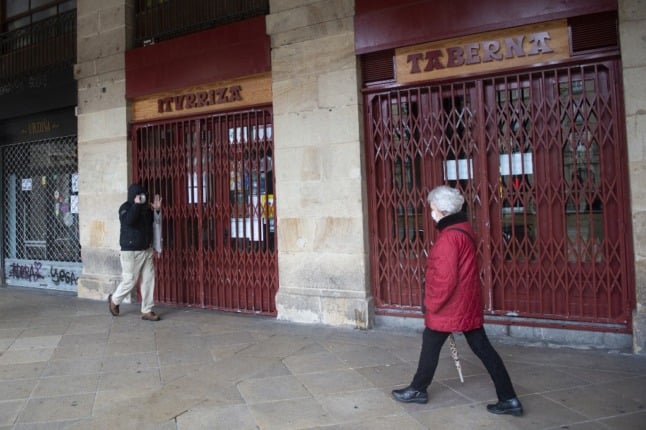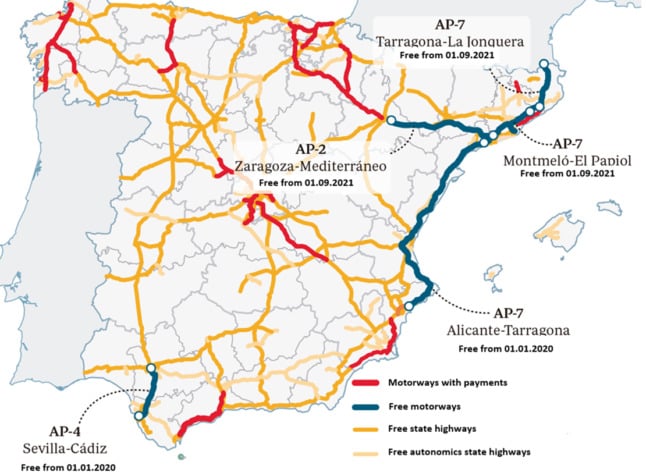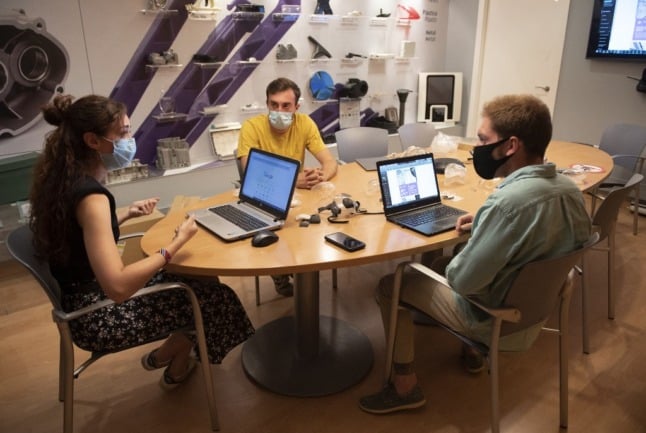EXPLAINED: What changes about life in Spain in September 2021?

September 2021 brings lots of changes for Spain's 47 million inhabitants, from a rise in the minimum wage and self-employed fees being decided, to the end of the ERTE furlough scheme and new potential traffic fines.
Spain to hit its first big vaccination target
Even though Spain hasn’t quite reached the 70 percent full vaccination target by late August promised by Prime Minister Pedro Sánchez, on Sunday August 29th the rate stood at 68.4 percent and the country looks set to reach the milestone within the first days of September.
The slowdown in August has been caused by the summer holidays rather than vaccine scepticism among Spaniards, and internationally Spain’s inoculation campaign is widely considered a success, with Our World in Data reporting it has the second highest share of vaccinated people of the world’s large countries after the UAE.
The Health Ministry headed by Carolina Darias has revised the new immunity target up to 85 percent, which would require a further 9 million people to be fully vaccinated.
The vaccination of younger generations is crucial for this to happen. Currently, around 70 percent of 39 to 12 year olds in Spain have at least one dose and health workers are now working on administering second doses to this age group.
READ MORE: ’70 percent vaccinated isn’t enough’ - Why Spain is revising its target for Covid herd immunity
End of the fifth wave, start of another one?
The explosive infection rate of Spain’s fifth wave is now descending at high speed, down by 40 percent over the past week and now standing at 277 infections per 100,000 people over the past 14 days.
Since it reached its peak in mid to late July, the incidence rate of the coronavirus has more than halved in 40 of Spain’s 50 provinces.
Hospitalisations and Covid deaths remain high - 864 fatalities in the last week - although many regions have reported these figures late and they could account for previous weeks (3,000 total deaths so far during Spain’s fifth wave).
Health authorities and experts agree there’s a clear downward trend but the efecto botellón (outdoor drinking effect), referring to how young people across big cities in Spain have gathered to party and forgotten about the pandemic, could determine whether a sixth wave develops, coinciding also with the return to school and work.
Keeping restrictions and an increased rate of inoculation among Spain’s unvaccinated is deemed crucial to prevent the Delta strain and other variants from taking hold of the country once again.
 Photo: Ander Guillenea/AFP
Photo: Ander Guillenea/AFP
Fifth furlough extension ends
Spain’s current ERTE extension ends on September 30th and it isn’t clear yet if a new agreement will be met to prolong the scheme that’s allowed people who have not been able to work as a result of the coronavirus crisis to claim 70 percent of their salaries.
Previous negotiations for the fifth extension in May weren’t straightforward, as the Spanish Social Security Minister pushed to give incentives to those who took a leap of faith and reopened their businesses.
Currently there are around 330,000 people who are using the furlough scheme in Spain, around half the number there were three months ago and far from the 3.6 million workers who were initially protected during the early months of the pandemic.
But the spike in seasonal jobs during the summer months will likely slow down and the tourism and hospitality sectors, which account for the majority of employees on ERTE, have already asked for the scheme to be maintained until early 2022.
When asked about a sixth ERTE extension in June, Labour Minister Yolanda Díaz said “I wish I could say it won’t be necessary”.
More toll-free motorways in Spain
As announced in January by the Spanish government, road sections belonging to four major motorways in Spain will become toll-free as of September 1st 2021.
The total amounts to 477 km, almost 200km less than the 664km promised initially.
The motorway sections that will no longer charge peajes (tolls) are the following, all located in the northeastern regions of Aragón and Catalonia:
- The AP-2 route between Zaragoza and El Vendrell in Tarragona
- The AP-7 route between the French border and Tarragona
- The C-32 section between Barcelona and Lloret de Mar
- The C-33 route between Barcelona and Montmeló
To find out more, click here.

Possible new driving fines
Spain’s General Directorate of Traffic (DGT) is looking for approval from the Spanish parliament to introduce five new fines as well as other amendments to the country’s traffic code in September. These are:
- Not switching off the engine when the vehicle is stationary or parked
- Holding a mobile phone even if you’re not using it
- Surpassing the speed limit when overtaking on secondary roads
- Having a speed camera detector in your vehicle
- Not wearing a helmet while riding an e-scooter
IN DETAIL: The five new fines Spanish traffic authorities want to roll out in September
A rise in the minimum wage?
It’s been in the pipeline since 2019 and now it seems that the increase in Spain’s SMI (Salario Mínimo Interprofesional) will go up for debate in September.
However, Spain’s Committee of Experts is proposing that the minimum wage be bumped up between €12 and €19 this year, rather than the €50 initially suggested by Labour Minister Yolanda Díaz in June.
Spain’s current minimum wage is set at €1,108.3 gross per month. In reality, this equates to €950 a month, payable in 14 instalments to allow for the double monthly salary in July and December.
Spain’s governing socialists allege they wish to continue lifting the salary bar year on year up to €1,200 by 2023.
READ MORE: How Spain plans to raise its minimum wage by as much as €250
Higher fees for self-employed workers in Spain?
If you’re one of those people who believes that Spain is no country for autónomos, this news may confirm those opinions.
The rise in Spain’s minimum wage is linked to a potential rise in monthly self-employment fees in Spain, both part of Royal Decree 2/2021.
If the minimum wage rises, so will the monthly amount autónomos currently pay in Spain, €3 to €12 more than the €283 established self-employed workers give for their social security.
In addition, exemptions or smaller social security contributions offered to self-employed workers on the ERTE scheme are also due to end in September.
Back to school with Covid measures
September also marks the return of pupils to schools in Spain and most of the Covid restrictions that were in place the previous academic year will remain, although the increasing rate of vaccination among 12 to 17 year olds (around 65 percent with one dose) means there will be new evaluations soon.
The main changes are that for children under 6 the maximum number of pupils per classroom will go from 20 to 25, and the safety distance for high school students will be lowered from 1.5 metres to 1.2 metres.
Social and class ‘bubbles’ will also remain in place during the next year in kindergartens and primary schools, meaning that just as during the previous year young children in the same class won’t have to keep a distance from each other.
The government has said that there will be continued use of masks in schools for pupils aged six or older, as well as strict times when certain age groups can enter and exit the school.
Age group shifts will also continue at lunch times and on the playground. Proper ventilation of classrooms will also be a priority.
EXPLAINED: Spain’s back-to-school Covid plans for September 2021
 Photo: Ander Guillenea/AFP
Photo: Ander Guillenea/AFP
Back to the office as well?
Although many employees have already returned to their workplaces, September marks the official return to the office after a year and a half.
Although Spain has a new remote working law thanks to the pandemic, there is no one-size-fits-all solution which all companies will apply to prevent Covid-19 infections.
The general consensus among experts is that in jobs where it’s not always necessary for employees to be there in person, a hybrid model of office and working from home will apply.
This may seem obvious in the current global climate but it still represents a big change in Spanish working habits and the consolidation of remote working even after Covid-19 no longer dominates our lives.
Companies such as Google , Amazon, Salesforce, Apple and Microsoft have already announced that they will adopt this strategy in Spain in the coming months.
READ ALSO:
- Will remote working become the norm in Spain after the Covid-19 pandemic?
- Do I have the right to refuse to return to my workplace in Spain?
More people allowed in sports stadiums
Spain has increased the permitted attendance for sports events for the month of September to 60 percent, the Minister of Health announced on September 1st.
Carolina Darias told a press conference that the cap on crowds at outdoor stadiums was being increased from 40 percent and for indoor arenas from 30 percent to 40 percent.
She said she particularly had La Liga football league and the top basketball league (ACB) in mind.
Darias added that it would be up to the different regions of Spain to decide whether to follow the guidelines or enforce a lower ceiling.
The measure came into effect immediately and applies to "the entire month of September", she said.
Fallas and other festivals.
September is harvest month in Spain, with wine-themed festivals marking the occasion in Jerez in Andalusia and Logroño in La Rioja, among other vino-producing parts of the country.
There will also be La Mercé celebrations (patron saint of Barcelona) on September 24th, the Albacete fair from September 7th to 17th and the Festival of Carthaginians and Romans in Cartagena (Murcia) from September 17th to 26th.
But perhaps most notable of all festivals taking place this September is Valencia’s Fallas from September 1st to 5th, marking the return of a spectacular fire-themed event which usually takes place in March after two years of cancellations and delays.
READ MORE: Everything you need to know about Valencia’s Fallas festival in September 2021

Photo: JOSE JORDAN / AFP
Comments
See Also
Spain to hit its first big vaccination target
Even though Spain hasn’t quite reached the 70 percent full vaccination target by late August promised by Prime Minister Pedro Sánchez, on Sunday August 29th the rate stood at 68.4 percent and the country looks set to reach the milestone within the first days of September.
The slowdown in August has been caused by the summer holidays rather than vaccine scepticism among Spaniards, and internationally Spain’s inoculation campaign is widely considered a success, with Our World in Data reporting it has the second highest share of vaccinated people of the world’s large countries after the UAE.
The Health Ministry headed by Carolina Darias has revised the new immunity target up to 85 percent, which would require a further 9 million people to be fully vaccinated.
The vaccination of younger generations is crucial for this to happen. Currently, around 70 percent of 39 to 12 year olds in Spain have at least one dose and health workers are now working on administering second doses to this age group.
READ MORE: ’70 percent vaccinated isn’t enough’ - Why Spain is revising its target for Covid herd immunity
End of the fifth wave, start of another one?
The explosive infection rate of Spain’s fifth wave is now descending at high speed, down by 40 percent over the past week and now standing at 277 infections per 100,000 people over the past 14 days.
Since it reached its peak in mid to late July, the incidence rate of the coronavirus has more than halved in 40 of Spain’s 50 provinces.
Hospitalisations and Covid deaths remain high - 864 fatalities in the last week - although many regions have reported these figures late and they could account for previous weeks (3,000 total deaths so far during Spain’s fifth wave).
Health authorities and experts agree there’s a clear downward trend but the efecto botellón (outdoor drinking effect), referring to how young people across big cities in Spain have gathered to party and forgotten about the pandemic, could determine whether a sixth wave develops, coinciding also with the return to school and work.
Keeping restrictions and an increased rate of inoculation among Spain’s unvaccinated is deemed crucial to prevent the Delta strain and other variants from taking hold of the country once again.
 Photo: Ander Guillenea/AFP
Photo: Ander Guillenea/AFP
Fifth furlough extension ends
Spain’s current ERTE extension ends on September 30th and it isn’t clear yet if a new agreement will be met to prolong the scheme that’s allowed people who have not been able to work as a result of the coronavirus crisis to claim 70 percent of their salaries.
Previous negotiations for the fifth extension in May weren’t straightforward, as the Spanish Social Security Minister pushed to give incentives to those who took a leap of faith and reopened their businesses.
Currently there are around 330,000 people who are using the furlough scheme in Spain, around half the number there were three months ago and far from the 3.6 million workers who were initially protected during the early months of the pandemic.
But the spike in seasonal jobs during the summer months will likely slow down and the tourism and hospitality sectors, which account for the majority of employees on ERTE, have already asked for the scheme to be maintained until early 2022.
When asked about a sixth ERTE extension in June, Labour Minister Yolanda Díaz said “I wish I could say it won’t be necessary”.
More toll-free motorways in Spain
As announced in January by the Spanish government, road sections belonging to four major motorways in Spain will become toll-free as of September 1st 2021.
The total amounts to 477 km, almost 200km less than the 664km promised initially.
The motorway sections that will no longer charge peajes (tolls) are the following, all located in the northeastern regions of Aragón and Catalonia:
- The AP-2 route between Zaragoza and El Vendrell in Tarragona
- The AP-7 route between the French border and Tarragona
- The C-32 section between Barcelona and Lloret de Mar
- The C-33 route between Barcelona and Montmeló
To find out more, click here.

Possible new driving fines
Spain’s General Directorate of Traffic (DGT) is looking for approval from the Spanish parliament to introduce five new fines as well as other amendments to the country’s traffic code in September. These are:
- Not switching off the engine when the vehicle is stationary or parked
- Holding a mobile phone even if you’re not using it
- Surpassing the speed limit when overtaking on secondary roads
- Having a speed camera detector in your vehicle
- Not wearing a helmet while riding an e-scooter
IN DETAIL: The five new fines Spanish traffic authorities want to roll out in September
A rise in the minimum wage?
It’s been in the pipeline since 2019 and now it seems that the increase in Spain’s SMI (Salario Mínimo Interprofesional) will go up for debate in September.
However, Spain’s Committee of Experts is proposing that the minimum wage be bumped up between €12 and €19 this year, rather than the €50 initially suggested by Labour Minister Yolanda Díaz in June.
Spain’s current minimum wage is set at €1,108.3 gross per month. In reality, this equates to €950 a month, payable in 14 instalments to allow for the double monthly salary in July and December.
Spain’s governing socialists allege they wish to continue lifting the salary bar year on year up to €1,200 by 2023.
READ MORE: How Spain plans to raise its minimum wage by as much as €250
Higher fees for self-employed workers in Spain?
If you’re one of those people who believes that Spain is no country for autónomos, this news may confirm those opinions.
The rise in Spain’s minimum wage is linked to a potential rise in monthly self-employment fees in Spain, both part of Royal Decree 2/2021.
If the minimum wage rises, so will the monthly amount autónomos currently pay in Spain, €3 to €12 more than the €283 established self-employed workers give for their social security.
In addition, exemptions or smaller social security contributions offered to self-employed workers on the ERTE scheme are also due to end in September.
Back to school with Covid measures
September also marks the return of pupils to schools in Spain and most of the Covid restrictions that were in place the previous academic year will remain, although the increasing rate of vaccination among 12 to 17 year olds (around 65 percent with one dose) means there will be new evaluations soon.
The main changes are that for children under 6 the maximum number of pupils per classroom will go from 20 to 25, and the safety distance for high school students will be lowered from 1.5 metres to 1.2 metres.
Social and class ‘bubbles’ will also remain in place during the next year in kindergartens and primary schools, meaning that just as during the previous year young children in the same class won’t have to keep a distance from each other.
The government has said that there will be continued use of masks in schools for pupils aged six or older, as well as strict times when certain age groups can enter and exit the school.
Age group shifts will also continue at lunch times and on the playground. Proper ventilation of classrooms will also be a priority.
EXPLAINED: Spain’s back-to-school Covid plans for September 2021
 Photo: Ander Guillenea/AFP
Photo: Ander Guillenea/AFP
Back to the office as well?
Although many employees have already returned to their workplaces, September marks the official return to the office after a year and a half.
Although Spain has a new remote working law thanks to the pandemic, there is no one-size-fits-all solution which all companies will apply to prevent Covid-19 infections.
The general consensus among experts is that in jobs where it’s not always necessary for employees to be there in person, a hybrid model of office and working from home will apply.
This may seem obvious in the current global climate but it still represents a big change in Spanish working habits and the consolidation of remote working even after Covid-19 no longer dominates our lives.
Companies such as Google , Amazon, Salesforce, Apple and Microsoft have already announced that they will adopt this strategy in Spain in the coming months.
READ ALSO:
- Will remote working become the norm in Spain after the Covid-19 pandemic?
- Do I have the right to refuse to return to my workplace in Spain?
More people allowed in sports stadiums
Spain has increased the permitted attendance for sports events for the month of September to 60 percent, the Minister of Health announced on September 1st.
Carolina Darias told a press conference that the cap on crowds at outdoor stadiums was being increased from 40 percent and for indoor arenas from 30 percent to 40 percent.
She said she particularly had La Liga football league and the top basketball league (ACB) in mind.
Darias added that it would be up to the different regions of Spain to decide whether to follow the guidelines or enforce a lower ceiling.
The measure came into effect immediately and applies to "the entire month of September", she said.
Fallas and other festivals.
September is harvest month in Spain, with wine-themed festivals marking the occasion in Jerez in Andalusia and Logroño in La Rioja, among other vino-producing parts of the country.
There will also be La Mercé celebrations (patron saint of Barcelona) on September 24th, the Albacete fair from September 7th to 17th and the Festival of Carthaginians and Romans in Cartagena (Murcia) from September 17th to 26th.
But perhaps most notable of all festivals taking place this September is Valencia’s Fallas from September 1st to 5th, marking the return of a spectacular fire-themed event which usually takes place in March after two years of cancellations and delays.
READ MORE: Everything you need to know about Valencia’s Fallas festival in September 2021

Join the conversation in our comments section below. Share your own views and experience and if you have a question or suggestion for our journalists then email us at [email protected].
Please keep comments civil, constructive and on topic – and make sure to read our terms of use before getting involved.
Please log in here to leave a comment.